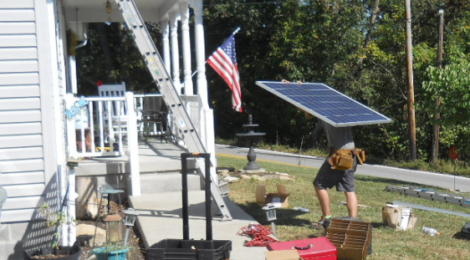Power Purchase Agreements can expand access to solar in West Virginia

West Virginia lawmakers have an opportunity to expand access to solar across the state, and it won’t cost taxpayers a dime. Today, West Virginians who want to go solar have limited options to do so. State law forbids electricity consumers from purchasing energy produced by a solar system they do not own. This unfair policy impedes our ability to go solar, costing our state jobs and economic development in the process.
Legalizing solar Power Purchase Agreements, or PPAs, can increase the number of West Virginians who can go solar, while creating good local jobs and economic development. PPAs allow electricity consumers to access the benefits of solar without purchasing a solar system outright. A PPA is a contract through which a third-party developer installs a solar array on a host customer’s property. The customer purchases electricity produced by the array at a fixed rate.
PPAs are particularly beneficial for tax-exempt institutions like schools, churches, and municipalities. These entities do not qualify for the federal solar tax credit, because they do not pay income taxes. They can, however, use PPAs to indirectly benefit from the federal tax credit. Essentially, the system’s owner benefits from the tax credit and can pass along those savings to the institution.
Third-party solar ownership played an important role in helping grow the American residential solar market. In the early part of this decade, it sparked adoption of residential solar by drastically lowering the upfront cost of solar for homeowners. At the trend’s peak in 2014, nearly 75% of all residential solar systems were purchased via third-party ownership. This number has since dropped to less than half of all residential solar deployed today.
As the solar market has grown, third-party ownership has declined in the residential sector. There are several reasons for this. From a financial standpoint, residential solar ownership is more lucrative over the long term. Owning a system means you also receive the tax credit as well as any ancillary benefits like local or state incentives, and renewable energy credits. As the U.S. solar market has matured and the technology has proven itself to lenders, more homeowners have been able to take out loans to finance their systems. While not as financially lucrative as paying for a solar system in its entirety upfront, paying for solar via a loan may be a better deal for homeowners than leasing it from a third party.
Solar PPAs remain the primary method through which commercial and nonprofit solar installations are financed. According to the Solar Energy Industries Association, 57% of all installed non-residential U.S. solar capacity in 2017 was third-party owned. Nearly 90% of solar systems installed on American schools since 2014 have been financed via PPAs.
Today’s market for solar is stronger than ever. Out-of-date laws that only serve the interests of monopoly utilities should not be allowed to hold West Virginia back. We should have the freedom to decide how we power our homes and businesses. Our legislators should act to legalize solar PPAs in West Virginia. You can encourage them do so by clicking here.
